section_d
2022年全国大学生英语竞赛C类_试题答案
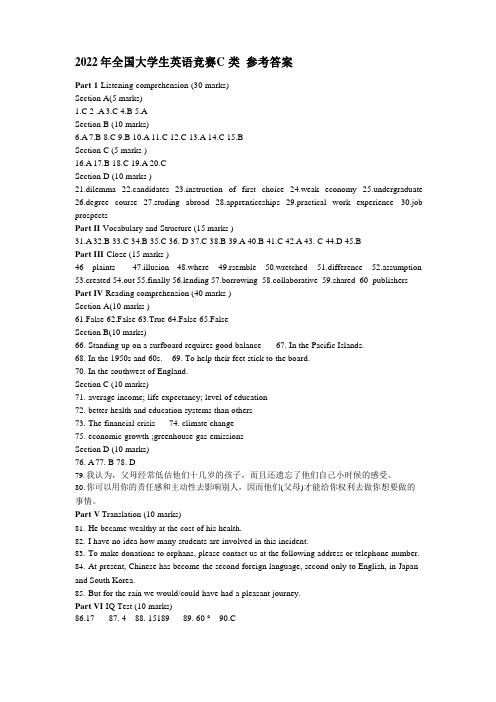
2022 年全国大学生英语竞赛C 类参考答案Part 1 Listening comprehension (30 marks)Section A(5 marks)1.C 2 .A 3.C 4.B 5.ASection B (10 marks)6.A7.B8.C9.B 10.A 11.C 12.C 13.A 14.C 15.BSection C (5 marks )16.A 17.B 18.C 19.A 20.CSection D (10 marks )21.dilemma 22.candidates 23.instruction of first choice 24.weak economy 25.undergraduate 26.degree course 27.studing abroad 28.apprenticeships 29.practical work experience 30.job prospectsPart II Vocabulary and Structure (15 marks )31.A 32.B 33.C 34.B 35.C 36. D 37.C 38.B 39.A 40.B 41.C 42.A 43. C 44.D 45.BPart III Cloze (15 marks )46 plaints 47.illusion 48.where 49.rsemble 50.wretched 51.difference 52.assumption 53.created 54.out 55.finally 56.lending 57.borrowing 58.collaborative 59.shared 60 publishers Part IV Reading comprehension (40 marks )Section A(10 marks )61.False 62.False 63.True 64.False 65.FalseSection B(10 marks)66. Standing up on a surfboard requires good balance 67. In the Pacific Islands.68. In the 1950s and 60s. 69. To help their feet stick to the board.70.In the southwest of England.Section C (10 marks)71.average income; life expectancy; level of education72.better health and education systems than others73.The financial crisis 74. climate change75. economic growth ;greenhouse gas emissionsSection D (10 marks)76. A 77. B 78. D79.我认为,父母经常低估他们十几岁的孩子,而且还遗忘了他们自己小时候的感受。
【练习】八年级上册短文填空及答案

八年级上册Unit1 Topic1 Section C根据情景、音标或所给单词的提示,填入适当的单词,使短文意思完整,行文连贯。
Ann likes sports very much. She goes cycling 1 /twa?s/ a week andoften goes mountain 2 (climb)on Sundays. She spends half an hour 3 (exercise) in the gym every day. She learns 4 /'be?sb?:l/ on Saturdays, andnow she plays it very well. She is also good at 5 (jump). There is going to6 a school sports meet next7 /'wi:kend/. She is going to take 8in the high jump and the long jump. Her classmates a re going to 9 her on.They are sure that she will 10 (win).1. 2. 3. 4. 5.6. 7. 8. 9. 10.八年级上册Unit1 Topic1 Section DFor the last 20 years, David Beckham was a very 1 /'fe?m?s/ soccer player.He played 2 teams in England, Spain, America and Italy. He 3 (arrive)in Beijing with his teammates 4 /'jest?rde?/.They are going to play5 China’s national team tomorrow.Soccer fans are very6 (excite).stay for long. They are 8But it’s too7 /b?d/ that the team isn’t going tonational team.(leave) for Japan the day after tomorrow for a game with Japan’s1. 2. 3. 4.5. 6. 7. 8.八年级上册Unit1 Topic2 Section CBasketball is one of the most popular sports in the United States and other partsof the world. It has a history of over a 1 /'sent??r?/ The inventor of basketball, James Naismith, came from Canada. He 2 (invent)basketball for his students in 1891. At first, it was an indoor game so that students could play in bad weather.Basketball soon 3 (become)very popular. In 1946 the National Basketball Association (NBA) came into being. There were many great basketballstars in the NBA. For many years they were all Americans. But now many good players come from other countries.Basketball is 4 an indoor and outdoor game. It is a team sport withtwo teams of five players each. The goal is to throw the ball t hrough the other side’s sk?t/, and to stop the other team 6 doing so. You can throw it5 /'bɑ?from any part of the court with one hand or both hands. You can also 7/pɑ:s/ the ball to your teammates. But you must 8 /'f?l??/ the rules. For example, you can’t9 the ball and run with it. To win basketball games, y ou should have good 10 (skill). But it is more important for you and the otherplayers to play as a team. You are sure to enjoy playing this popular sport.1. _2.3.4.5.6. 7. 8. 9. 10.八年级上册Unit1 Topic2 Section DSports are important in English life. The people of England are sports lovers.Some of the world’s1 /'fe?m?s/ sports began here, 2 as football andcricket.Football is a fast game played in winter and early spring, Lots of people playfootball in parks or playgrounds just for fun. With hundreds of years’ history, it is of the most popular 3 (sport) in England. The English love football verymuch and they 4 /t?:nd/most of their main players into famous 5(person) .David Beckham and Bobby Charlton became 6 (hero)for manychildren. The most interesting part in the English football year is the FA (FootballAssociation) 7 Final each May.Cricket is a national sport in England. It is a very popular summer sport. It is agame played on 8 /grɑ?s/ by two teams of eleven players each. Players wearwhite clothes and score 9 (point) by hitting the ball with a bat. People can10 around the green, enjoying the sun, having drinks and watching the teamgames.1. 2. 3. 4. 5.6. 7. 8. 9. 10.八年级上册Unit1 Topic3 Section CThe modern Olympics started in Athens, Greece in 1896. It’s motto is “Faster,The Olympic rings are a symbol of the OlympicHigher, 1 (strong)”.Games. There are five rings, and they 2 /st?nd/ for five parts of the world.The colors of the rings are 3 /blu:/, yellow, black, green, and red. You canfind at 4 one of these colors in the flag of each country in the world.There 5 summer Olympics and winter Olympics. They are both heldevery four years. The winter Olympic Games are usually held two years 6/b?'f?:/he summer Olympic Games.Nowadays, the Olympic Games are held by different 7 (city) in turn.People from all over the world meet to complete and become friends. The Olympicsare 8 (become) more and more popular. In the 9 /'fju:t??(r)/, morecities will have the 10 to hold the Olympics and the Olympic Games will bemore exciting.1. 2. 3. 4. 5.6. 7. 8. 9. 10.八年级上册Unit1 Topic3 Section DSunday, Sept. 21st SunnyLast week our school held a sports meet. Everyone in our class felt very 1/?ks'a?t?d/because we won. In the boys’ relay race, Michael ran very fast and our classwon 2 (one) place. YuTing is good 3 the long jump and she alsowon. We’re 4 /'s?r?/that we did badly in the high jump, but we’re sure wewill do 5 (well) next time.I took part in the 6 ( boy )400-meter race. I did my 7 and wasthe first to cross the 8 /'f?n??/ line. Now I love sports more I want to be asoccer 9 (play). I will do more exercise every day and I hope some day I’be 10 to take part in the Olympic Games.1. 2. 3. 4. 5.6. 7. 8. 9. 10.八年级上册Unit2 Topic1 Section CIt was a beautiful day and the children played in the park. Maria flew her kitewhile Michael played on his skateboard. “Look! I’m going to try 1he said. Michael did a difficult jump. Then the skateboard went up/'s?mθ??/new,” and Michael 2 (fall)down with a cry. The other children ran to him andasked. “Are you all right? Are you 3 ?”“Oh, my leg, my arm! I feel 4 /'ter?bl/!” Michael cri ed.5 .” Jane“I think you should see a doctor,” said Kangkang, “I’ll call aand Maria looked after poor Michael. “My leg really hurts,” he said.Soon the taxi came and 6 (take)Michael and his friends to the hospital.he 7 /'eksreiz/ show that it’s not serious. You can takeThe doctor told them, “Thim home. Michael, you need to rest at home for a week. Here are some pills. Taketwo pills, three 8 (time) a day.”The children left the hospital. Kangkang helped Michael to 9(walk). They were glad that the accident wasn’t serious and Michael felt much10 .1. 2. 3. 4. 5.6. 7. 8. 9. 10.八年级上册Unit2 Topic2 Section CMothers always tell their children what they should eat.When Kangkang was a child, his mother often told him, “Be careful not to eatShe said it might cause 2 (ill).too much 1 /s?: lt/or sugar.” Maria’s mother always took care3 Maria very well. For example, Maria’steeth were very 4 /wi:k/, so her mother said that she mustn’t eat too much candy or ice 5 .Milk is a healthy drink. Jane didn’t like it, but her mother always 6(force)her to drink it. Every morning before she left for school, she had to drink aglass of milk 7 /b?'k?:z/ her mother was always watching her.During Michael’s childhood, he had to eat many 8 (vegetable), and fruit to keep healthy. Once, cabbage was on his plate. As soon as Michael saw it, he got 9 . But his mother made him 10 (taste) it. He was surprised to find that it was delicious!1. 2. 3. 4. 5.6. 7. 8. 9. 10.八年级上册Unit2 Topic3 Section C(Kangkang’s father, Dr. Li, is giving a talk about health to the students.) You need to have healthy 1 (eat) habits. Breakfast gives you enough energy for the morning. So don’t go to school 2 it. Fruit and vegetables are good for your health, but fast food, like photo chips, will make you fat and unhealthy. So eat the 3 /ra?t/food to keep you healthy.Playing sports can also help you keep fit. But sometimes accidents can 4necessary 5 you to /'h?p?n/, so try to stay safe when you play them. It’slearn about first aid. Then you can help yourself or others if an accident happens.Happiness is important to our health. It is the best 6 /'med?sn/. When you are ill, try to be happy and you’llfeel 7 (well). On the other hand, you may feel ill if you are always unhappy. So, be happy to be healthy.You must stay away from 8 (smoke) and drinking. many students think it’s 9 /ku:l/ to smoke and drink. But they don’t know smoking or drinking can cause many illnesses. You should say 10 to smoking and drinking1. 2. 3. 4. 5.6. 7. 8. 9. 10.八年级上册Unit2 Topic3 Section DWarm up.It is important to warm up before you exercise. You need to stretch 1 (you) legs, arms, back and neck 2 /b?'f?:/ you do any difficult activities like running.Find good places to exercise.You do not need to spend a lot of money 3 (exercise). You can run or play sports in a park or in your school gym. You don’t need 4 buy exercise equipment for your home. Just get your body moving!Don’t work too hard.Choose a sport that you enjoy and then your exercise will be fun 5 /?n'sted/of work. Also, you only need to exercise a few times each week. If you exercise for 30 minutes each time, you will stay 6 (health).Drink enough water.7 is important to drink water when you exercise. Your body needs the water for energy and for 8 (keep) cool.Be careful!If you 9 /h?:t/ yourself while you are exercising, rest until you feel better. Exercising when you are hurt is 10 for your health.1. 2. 3. 4. 5.6. 7. 8. 9. 10.八年级上册Review Unit1-Unit2In the old days, the Olympic Games were religious activities. Greece held the1 (one) Olympic Games in 776 B.C. The Games lasted just for one day. Only2 (man) could be in the Games. Women had no right to take3 in the Olympic Games until 1912.The first___4____/'m?dn/ Olympic Games were held in Greece in 1896. Just 241 men from 14 countries competed in 43 events in nine sports. Starting in 1896, the Olympic Games were held every four years 5 /?k'sept/ during the World 6 (war) I and II. In the 2012 London Olympics , about 10 500 athletes 7 205 countries took part in 302 events. The first 8 /'w?nt?/ Olympic Games were held in France in 1924 to give athletes chance 9 compete in snow and ice sports .The Winter Olympics are held 10 four years, two years after each Summer Olympics.1. 2. 3. 4. 5.6. 7. 8. 9. 10.八年级上册Unit3 Topic1 Section CScrapbooking is a hobby. It was popular for 1 than 500 years. People called it a 2 /'frend??p/book. They kept pictures, letters, poems and other things they wanted to remember.Today people collect many things in scrapbooks. Some people have funny collection, like the world’s most 3 /'stju:p?d/ ideas or pictures of the world’s most 4 /'?gli/ dogs. Other people may collect stories about bad weather.It is easy to get started. First, you should decide what you want to collect. Start 5 just one idea. Next, you will need a book with background paper, 6 (scissor) and glue. You need the scissors to 7 out the pictures or stories. You need the glue to stick them 8 the background paper.You can be very busy and collect many things or ____9____/'leizi/ and collect few things. It’ll be lots of fun to make your scrapbook and you can___10_____ it with your friends.1. 2. 3. 4. 5.6. 7. 8. 9. 10.八年级上册Unit3 Topic1 Section DPets are special. They may be 1 /'evr?de?/ pets like dogs or cats, or theymay be dangerous pets like 2 (snake). All pets 3 (provide)their owners with love and comfort in their lives.My favorite pet is a pig. I call him Pink, 4 his color is light pink. He is very clever and I 5 /ki:p/ him in the house. He is clean. He likes water and I often help him 6 a bath in the pond behind my house. He enjoys 7 (eat)8 /'wee?(r)/ they are good or not. fruit and vegetables, and he doesn’t mindPink likes walking, too. So I often take him 9 for a walk. He always 10 (follow) me, just like a little friend. I love him very much. He is special to me.1. 2. 3. 4. 5.6. 7. 8. 9. 10.八年级上册Unit3 Topic 2 Section BClassical music is serious music. People usually 1 /?n'd???/ it at a concert or in a theater. Beethoven and Mozart 2 (write) great classical music.Pop music often comes and 3 (go) quickly. It is usually about love and 4 /'evr?de?/ life. Country music, rock music and jazz are all 5 /p?p]/music. They are very 6 with young people.songs .Guo Folk music is special. It is a 7 /pɑ:t/of the working people’s Lanying, Song Zuying and Tengri are 8 for their folk songs.1. 2. 3. 4.5. 6. 7. 8.八年级上册Unit3 Topic2 Section CDo you know Wolfgang Amadeus Mozart? The great composer, Mozart, started writing music when he was just a little boy. Here’s a story about Mozart when he 1 (be) a child.Father Mozart 2 /'ju:zd/ to give his daughter, Nannerl, music lessons on the piano. And Mozart was in the room. He watched and listen to every 3 (note)“ 4 I have his elder sister played. One day, when her lesson was over, he asked,a lesson ,papa?”“You are too little!” said Father Mozart.When Father Mozart and Nannerl left the room, little Wolfgang went up to the piano and pressed the keys. He 5 (smile). The music sounded 6 /'bju:t?ful / !Wolfgang was playing well 7 Mozart’s father heard him and came to see him.any help. Father Mozart decided to give him music lessons.Soon Mozart played as well as his big sister, Nannerl. He learned 8 quickly that his father was very happy. But when Wolfgang started to 9 /ra?t/ music by himself. Father Mozart was surprised. No one could believe that a little boy of five could write such beautiful music. He was an amazing boy, a 10 (bear) musician.1. 2. 3. 4. 5.6. 7. 8. 9. 10.八年级上册Unit3 Topic2 Section DThere are all kinds of music in the world. Music 1 (make) people happy.Good music brings people comfort and 2 /p?:s/ of mind. Everyone lovesmusic but different people have different 3 (taste).Kangkng likes piano very much. When he was eight, his father asked a musicteacher to teach him to 4 the piano. It’sgreat fun for him. Li Xiang likeslistening to jazz. He thinks the American jazz music sounds wonderful. But Tom hatesjazz. He thinks it is too 5 (noise). Violin music is his favorite. He says classicalmusic played 6 the violin makes him happy. Wang Junfeng plays the drumsvery well. He thinks drum playing is very exciting. Wang Junfeng says that every7 /'k?lt??/ has its own special kind of drumming. He likes to listen to 8/sa?θ/ American drumming best.All of these children are music 9 (fan). Different kinds of music makethem 10 /'h?p?/.1. 2. 3. 4. 5.6. 7. 8. 9. 10.八年级上Unit3 Topic3 Section CIt was snowy and dark on the last evening of the year. Many people were gettingtogether in their warm homes. A 1/p?r/ little girl was still walking in thestreets with no shoes. There were some matches in her hand.the little girl cried in a low 2 . No one heard her “Matches, matches!”when they were passing by. She didn’t sell any matches and no one gave her a3 /k??n/. The wind was blowing4 (strong), and the snow was 5(fall) down on her long hair. She felt cold and 6 .Lights were shining from every window. But the little girl was afraid to gohome without 7 (sell) one box of matches, because her father would 8/b??t/ her.“Ah, a burning match may warm me up!” she thought. She lit three matches. Whenthe matches were burning, she saw a warm stove, a delicious roast goose and abeautiful Christmas tree. But all these disappeared when the flames went out. Thenshe lit a fourth match. A kind old woman was standing there.“Grandmother!” cried the little girl, “Take me with you.” Her grandmother smi and 9 /held/ the girl in her arms.On the morning of the new year, the girl was lying against the wall, 10(die)!1. 2. 3. 4. 5.6. 7. 8. 9. 10.八年级上Unit3 Topic3 Section DBefore 1800, many people spent one day a week at church. In England,people called it a “holy day”. On that day, they rested and prayed.In the early 1800s, 1/'s?nde?/was the “holy d ay”.2,many workers played games and 3 (have) fun on that day. And then they felt4 tired to work on Monday mornings. In the USA, workers called them “blue Mondays”.To 5 /s?lv/the problem of “blue Mondays”, t he English madeSaturday afternoon a 6 /'h?l?de?/ in 1874. At one o’clock, everyone stopped7 (work). This was the beginning of the idea of the weekend in England. By 1930,most American offices were closed 8 Saturday afternoons. By 1940,offices and 9 (factory) in the USA were closed all day on Saturdays, and thetwo-day weekend 10 .1. 2. 3. 4. 5.6. 7. 8. 9. 10.八年级上Unit4 Topic1 Section CRainforests are thick forests in the hot parts of the world. It rains a lot and theground is always 1/wet/. It’s always dark and hot in rainforests. Rainforests cover 6% of the 2 (earth) surface. The provide places to live for thousands ofplants and animals found nowhere else 3 Earth. There are lots of tall treesand other different kinds of plants. Thousands and thousands of animals live in rainforests. Many of them live in the trees over 30 meters from the ground.Rainforests are very 4 /?m'p?:tnt/ to us. They are the lungs of theearth. The plants in the forests help to make the air 5 and cleaner. They alsohelp to hold the water when it rains and keep the water cycling. They play animportant part in 6 (control) the climate. Rainforests also help to keep thebeauty of nature. Rainforests provide us with 7 /w?d/, food, medicine, andmany more useful things .Without rainforests many beautiful plants and animalswould 8 out. We need rainforests for many 9 (reason). But now, rainforests are becoming smaller and smaller, so we should 10 /pr?'tekt/ them.1. 2. 3. 4. 5.6. 7. 8. 9. 10.八年级上Unit4 Topic1 Section DPandas l ive in the forests and mountains of Southwest China. They feed on1 But now they have less and less2 /l?nd/ to live on. So pandas are becoming3 (few) in number.The heaviest animals in the 4 are not elephants. They are blue whales.They are the 5(large) but they feed on the smallest 6 /s?:/ animals. Now they are in danger because some people 7 their ocean homedirty and others 8/k?l/ whales for their meat.Chinese tigers live in the south of China. They are also in 9 now. Theyare the oldest type of tigers in the world and they eat small animals. Some people kill tigers 10 their fur and bones.1. 2. 3. 4. 5.6. 7. 8. 9. 10.八年级上册Unit 4 Topic 2 Section CMany earthquakes happen every year. Some of these earthquakes are very strong. When they happen in cities, they can be very 1 /'s??r??s/ . Many people will behurt or die in the earthquakes. Knowing some ways to protect yourself will help to keep you 2 in the earthquake.If you are indoors when the earthquake 3 (happen), the safest place is under a strong table or desk. Sitting on the floor in a doorway or close to a wall issafer than standing in the 4 /'m?dle/of a room. Remember to protect your head and neck with your arms. Stay away 5 windows, tall furniture and pictures or anything that may fall on you . Do not try to run out of the building.If you are out of doors, move to clear 6 (area). Get away from buildings and trees. Be very 7 /'ke?fl/ of fallen power lines.The danger is not over when the strong 8 (shake) stops. There will be some shocks after most earthquakes. We call them aftershocks and they 9/'s?mta?mz/ can be more dangerous than the first earthquake.When it is safe for you to move around, check the people near you. Some may need help. You may feel 10 , but you should try to stay calm. That is the most important thing to do in the earthquake.1. 2. 3. 4. 5.6. 7. 8. 9. 10.八年级上Unit 4 Topic 2 Section DAt 2:28 in the afternoon, on May 12, 2008, a 1 /'ter?ble/ earthquake happened here. It killed 2 (many) than 69 000 people . Five million people lost3 (they)homes. Many students died when their schools4 down. But with the help of the5 /h??l/ nation, people in Wenchuan are rebuilding their homes now and they are6 (return) to normal life. The children are 7to study in new, safe schools. The people of Wenchuan are very 8 /bre?v]/ and they are starting their lives over 9 . Now a more beautiful new Wenchuan has 10 (appear)1. 2. 3. 4. 5.6. 7. 8. 9. 10.八年级上Unit 4 Topic3 Section CThe Internet is changing the world. It is 1 (become) an important part of our lives.The Internet makes our lives more 2 /'?ntr?st?? /. We can get all kinds of 3 on the Internet and share it with others. We can make friends and share our ideas and feeling with each other by sending emails or chatting 4 /?n'la?n/ .We can also do shopping , study, listen to music and 5 movies. This helps make life 6 (easy).However, the Internet is not 7 /'p?:f?kt/. We should use it safely. Everyone can post information, and not all of it is 8 . Some people use the Internet to hurt others and try to get money by cheating. Some young people usually spend too much time 9 (play) games and so on.The Internet can 10 /t?e?nd?/ our lives for the better , but we should use it carefully.1. 2. 3. 4. 5.6. 7. 8. 9. 10.八年级上册Unit 4 Topic3 Section DWould you like to learn English on the Internet? Your search 1 (result) can be very interesting . For example, at online 2 /'gr?m?(r)/ websites , there is advice about 3 to correct your English grammar. Famous English-speaking writers can tell you 4 writing on their websites. On the Internet , you may 5 /ra?t/ emails to friends in other countries and then read their emails to you . If you want to change English words 6 Chinese or Chinese words into English, then there are websites that can do this for you. English websites from Canada or America can help you to improve your listening 7 (skill). You can listen to English news, poems and songs. Finally, it is 8 /'p?s?bl/to look up new words in an online 9 /'d?k??nr?/. Learning English on the internet is 10 (easy) and interesting.1. 2. 3. 4. 5.6. 7. 8. 9. 10.参考答案八年级上册Unit1 Topic1 Section C1. twice2.climbing3.exercising4.baseball5. jumping.6. be7. weekend8.part9.cheer 10.win八年级上册Unit1 Topic1 Section D1.famous2. with3.arrived4.yesterday5.against6.excited7.bad8.leaving八年级上册Unit1 Topic2 Section C1.century2. invented3. became4. both5.basket6. from7. pass8. follow9.hold 10.skills八年级上册Unit1 Topic2 Section D1.famous2.such3.sports4.turned5. persons6. heroes7.Cup8.grass9.points 10.sit八年级上册Unit1 Topic3 Section C1. Stronger2. stand 3 .blue 4. least 5. are6 .before7 .cities8 .becoming 9. future 10 .chance八年级上册Unit1 Topic3 Section D1 . excited2 . first3 .at 4.sorry 5.better6. boys’ 7 .best 8 .finish 9.player 10. able八年级上册Unit2 Topic1 Section C1 .something2 .fell 3. hurt 4 .terrible 5. taxi6. took7. X-rays8. times9.walk 10 .better八年级上册Unit2 Topic2 Section C1 .salt2 .illness 3. of 4 .weak 5. cream6. forced 7 .because 8 .vegetables 9 .mad 10. taste八年级上册Unit2 Topic3 Section C1.eating2.without3.right4.happen5.for6.medicine7.better8.smoking9.cool 10.no八年级上册Unit2 Topic3 Section D1.your2.before3.exercising4.to5.instead6.healthy7.It8.keeping9.hurt 10.bad八年级上册Review Unit1-Unit21.first2.men3.part4.modern5.except6.Wars7.from8.Winter9.to 10.every八年级上册Unit3 Topic1 Section C1.more 2.friendship 3.stupid 4.ugly 5.with6.scissors7.cut8.tozy 10.share八年级上册Unit3 Topic1 Section D1.everyday2.snakes3.love4.because5.keep6.take7.eating8.whether9.out 10.follows 八年级上册Unit3 Topic 2 Section B1. enjoy2.wrote3.goes4.everyday5. pop6.popular7.part8.famous八年级上册Unit3 Topic2 Section C1.wased3.note4.May5.smiled6. beautiful7.without8.so9.write 10.born八年级上册Unit3 Topic2 Section D1.makes2.peace3.tastes4.play5.noisy6. on7.culture8.South9.fans 10.happy八年级上册Unit3 Topic3 Section C1. poor2.voice3.coin4.strongly5.falling6. hungry7.selling8.beat9.held 10.dead八年级上册Unit3 Topic3 Section D1. Sunday2.However3.had4.tired5.solve6. holiday7.working8.on9.factories 10.began八年级上册Unit4 Topic1 Section C1.wet2.earth’s3.on4.important5.fresher6.controlling7.wood8.die9.reasons 10.protect八年级上册Unit4 Topic1 Section D1. bamboo2. land3.fewer4.worldrgest6. sea7.make8. kill9. danger 10.for八年级上册Unit 4 Topic 2 Section C1.serious2.safe3.happens4.middle5.from6.areas7.careful8.shaking9.sometimes 10.afraid八年级上册Unit 4 Topic 2 Section D1.terrible2.more3.their4.fell5.whole6.returning7.able8.brave9.again 10.appeared八年级上册Unit 4 Topic3 Section C1.becoming2.interestingrmation4.online5.watch6.easier7.perfect8.true9.playing 10.change八年级上册Unit 4 Topic3 Section D1.results2.grammar3.how4.about5.write6.into7.skills8.possible9.dictionary 10.easy。
福建省福州时代中学八年级上学期英语Unit 2 Topic 2 Section C D同步校本作业
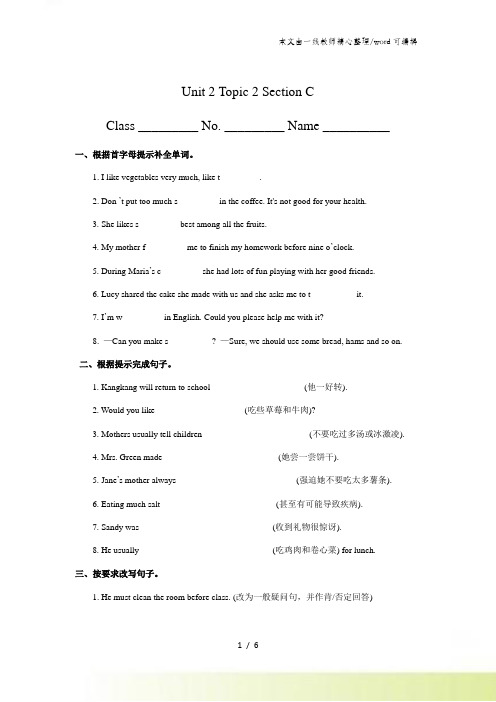
Unit 2 Topic 2 Section CClass _________ No. _________ Name __________一、根据首字母提示补全单词。
1. I like vegetables very much, like t_________.2. Don ’t put too much s_________ in the coffee. It's not good for your health.3. She likes s_________ best among all the fruits.4. My mother f_________ me to finish my homework before nine o’clock.5. During Maria’s c_________ she had lots of fun playing with her good friends.6. Lucy shared the cake she made with us and she asks me to t__________ it.7. I’m w_________ in English. Could you please help me with it?8. —Can you make s__________? —Sure, we should use some bread, hams and so on.二、根据提示完成句子。
1. Kangkang will return to school _____________________(他一好转).2. Would you like ____________________(吃些草莓和牛肉)?3. Mothers usually tell children ________________________(不要吃过多汤或冰激凌).4. Mrs. Green made __________________________(她尝一尝饼干).5. Jane’s mother always ___________________________(强迫她不要吃太多薯条).6. Eating much salt __________________________(甚至有可能导致疾病).7. Sandy was ______________________________(收到礼物很惊讶).8. He usually ______________________________(吃鸡肉和卷心菜) for lunch.三、按要求改写句子。
2021仁爱版七年级下册英语:Unit8Topic1 SectionABCD学案

初中七年级英语教学案课题:Unit8 Topic1 SectionA班级:学生姓名:学习目标:1.预习p81---82的单词。
2.学习询问天气状况的句型并能熟练运用。
自学指导:1.大声朗读1a ,并熟练掌握询问天气的句型:What’s the weather like…? How is the weather…?2.完成并朗读2a .并掌握询问季节的句型:Which season d o like best?=What is yourfavorite season?3.在掌握1a 、2a的基础上完成1b .练习1c、2b部分。
单项选择( )1.Which teacher do you like ,Mr. Wang ,Mr.l ee or Miss Cai?A.goodB.betterC.best( )2.It’s fine today .It is a good day for .A.to walkB.walkingC. Walks( )3.The weather of Hainan is very in winter.A. coolB.warmC. Hot( ) 4.You,re not a child now. You shoul d l earn yourself.A. l ooked afterB. to l ook afterC.l ook after.( ) 5.He was born the spring of 1993.A. onB. inC.at知识点击:1.What‘s the weather li ke in spring? 春天天气怎么样?“What‘s the weather like---?/How’s the weather---?”是用来询问天气状况的句型。
如;What‘s the weather like there in winter?=How‘s the weather there in winter?那里的冬天怎么样。
仁爱英语七年级下册Unit7 Topic3 Section A ---D基础巩固测试题(含答案)
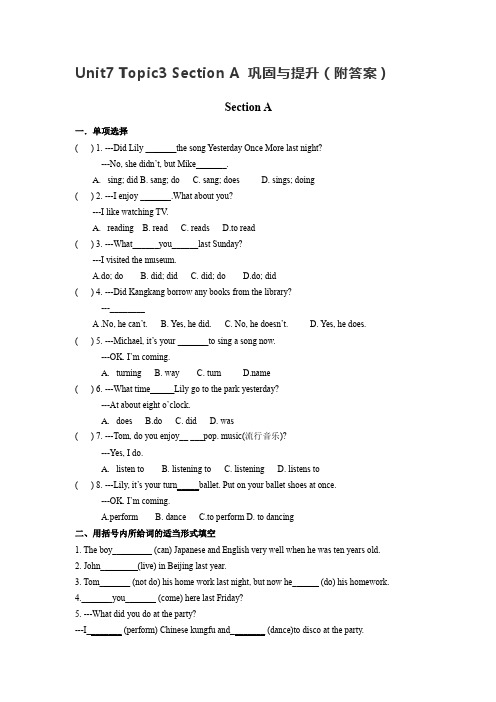
Unit7 Topic3 Section A 巩固与提升(附答案)Section AA.sing; didB. sang; doC. sang; doesD. sings; doing( ) 2. ---I enjoy _______.What about you?---I like watching TV.A.readingB. readC. readsD.to read( ) 3. ---What______you______last Sunday?---I visited the museum.A.do; doB. did; didC. did; doD.do; did( ) 4. ---Did Kangkang borrow any books from the library?---________A .No, he can’t. B. Yes, he did. C. No, he doesn’t. D. Yes, he does. ( ) 5. ---Michael, it’s your _______to sing a song now.---OK. I’m coming.A.turningB. wayC. turn( ) 6. ---What time _____Lily go to the park yesterday?---At about eight o’clock.A.doesB.doC. didD. was( ) 7. ---Tom, do you enjoy__ ___pop. music(流行音乐)?---Yes, I do.A.listen toB. listening toC. listeningD. listens to三、句型转换1. I did my homework at home yesterday. (改为否定句)I__________my homework at home yesterday.2. Lucy recited a Chinese poem at her birthday party. (改为一般疑问句)_____Lucy_____a Chinese poem at her birthday party?3. Did you enjoy yourselves at the party? (改为同义句)Did you____________________at the party?4. I came back home at 9:30 last night. (对画线部分提问)__________did you come back home last night?5. Lucy and Lily sang English songs and performed ballet at the party. (对画线部分提问) __________Lucy and Lily_____at the party?Section A参考答案及解析一、单项选择1.A一般过去时变一般疑问句时,did后面接动词原形。
Unit3 T3 SectionA-SD课时检测 2022-2023学年仁爱版英语八年上含答案

仁爱版英语八年级上册Unit3 Topic 3 SectionA-SectionD每课时检测(有答案)U3 T3 Section A一、翻译下列短语。
1.稍候(电话用语) ___________________2.接电话 ___________________3.在这/那个时候 ___________________4.淋浴 ___________________5.收拾行李 ___________________6.从....到...... ___________________7.听新闻 ___________________8.与....聊天 ___________________9.参观博物馆 ___________________10.北京烤鸭 ___________________二、根据语境、音标或单词提示填空。
1.You should __________ the questions in the first part in ten minutes.2.I was taking a __________ /'ʃaʊə(r)/ at 9 o'clock last night.3.Many people like Beijing roast __________ /dʌks/.4.I visited a __________ /mju:'zi:əm/ yesterday morning and saw many old things there.5.My sister enjoys __________ (chat) with her friend on the Internet on weekends.三、单项选择。
( )1. Tian Le, Shang Qing and Ren Jie __________ on the playground at ten o'clock yesterday.A.ranB. are runningC. were playing( )2. -I was watching TV from 8:00 to 10:00 last night. What about you? -I __________ the newspaper.A.takeB. am takingC. was reading( )3. -Where did you go yesterday after supper? I called you but nobody __________. -I was in the library.A.spokeB. cameC. answered( )4. -Were you playing in the park at 3 :00 yesterday afternoon? -No. I __________ the museum.A.sawB. was visitingC. am visiting( )5. Jim often helps his mother do some __________, because his mother has no time to go to the market.A.washingB. cleaningC. shopping四、情景交际。
仁爱英语七年级下册unit6topic2sectionc.d练习
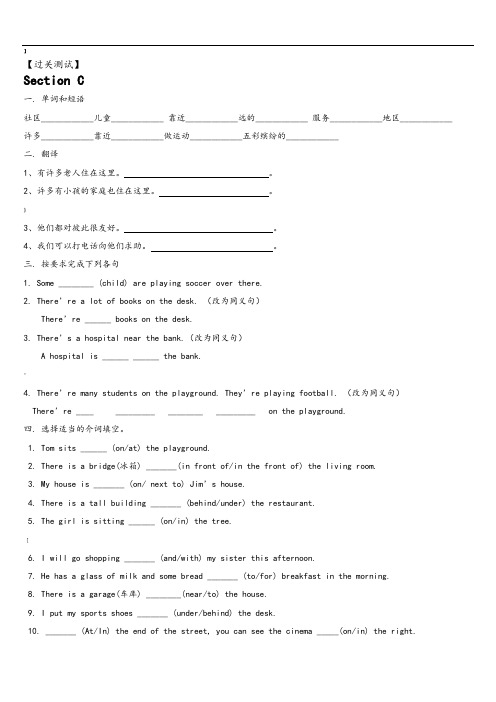
】【过关测试】Section C一. 单词和短语社区____________儿童____________ 靠近____________远的____________ 服务____________地区____________许多____________靠近____________做运动____________五彩缤纷的____________二. 翻译1、有许多老人住在这里。
2、许多有小孩的家庭也住在这里。
》3、他们都对彼此很友好。
4、我们可以打电话向他们求助。
三. 按要求完成下列各句1. Some ________ (child) are playing soccer over there.2. There’re a lot of books on the desk. (改为同义句)There’re ______ book s on the desk.3. There’s a hospital near the bank.(改为同义句)A hospital is ______ ______ the bank."4. There’re many students on the playground. They’re playing football. (改为同义句)There’re ____ _________ ________ _________ on the playground.四. 选择适当的介词填空。
1. Tom sits ______ (on/at) the playground.2. There is a bridge(冰箱) _______(in front of/in the front of) the living room.3. My house is _______ (on/ next to) Jim’s house.4. There is a tall building _______ (behind/under) the restaurant.5. The girl is sitting ______ (on/in) the tree.[6. I will go shopping _______ (and/with) my sister this afternoon.7. He has a glass of milk and some bread _______ (to/for) breakfast in the morning.8. There is a garage(车库) ________(near/to) the house.9. I put my sports shoes _______ (under/behind) the desk.10. _______ (At/In) the end of the street, you can see the cinema _____(on/in) the right.五. 用所给词的正确形式填空。
仁爱版英语七年级上册Unit 1 Topic 3 How old are you (Section ABCD)教学课件
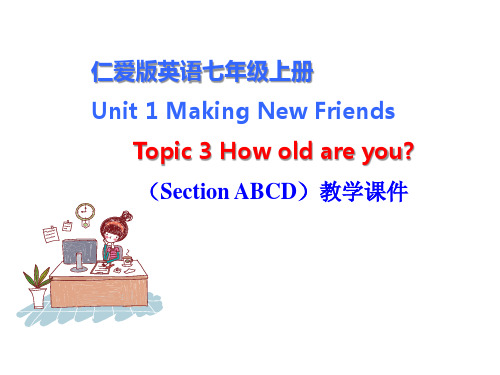
QQ number
What’s your QQ number?
one
eleven
你 two
twelve
发 three
thirteen
现 four + teen = fourteen
规 five
fifteen
律 six + teen = sixteen
了 seven + te say.
Excuse me, what’s this in English?
(视频P19-1a)
map
eraser
It’s an eraser.
pen pencil desk
A: What’s this in English? B: It’s a pen. A: How do you spell it? B: P-E-N, pen. A: Thank you. B: That’s OK.
(录音P18-3)
Hello, Maria! What grade are you in?
I’m in _G__ra_d_e_ _S_e_v_e_n_.
Are you in Grade Seven, too?
Yes, I am.
Who’s that?
That’s Nancy.
How old is she? What class is she in?
A: What’s that in English? B: It’s a toy. A: Can you spell it, please? B: Yes. T-O-Y, toy. A: Thanks. B: You’re welcome.
It’s __a__b_o_o_k_.
What’s that in English?
仁爱u1t3翻译
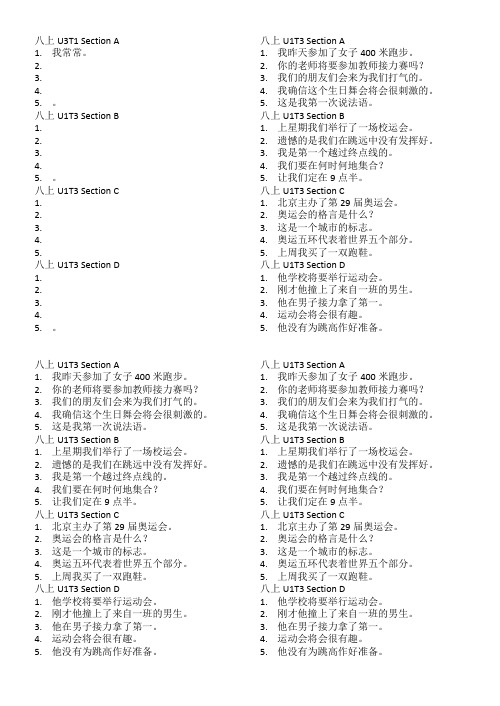
八上U3T1 Section A 1.我常常。
2.3.4.5.。
八上U1T3 Section B 1.2.3.4.5.。
八上U1T3 Section C1.2.3.4.5.八上U1T3 Section D 1.2.3.4.5.。
八上U1T3 Section A1.我昨天参加了女子400米跑步。
2.你的老师将要参加教师接力赛吗?3.我们的朋友们会来为我们打气的。
4.我确信这个生日舞会将会很刺激的。
5.这是我第一次说法语。
八上U1T3 Section B1.上星期我们举行了一场校运会。
2.遗憾的是我们在跳远中没有发挥好。
3.我是第一个越过终点线的。
4.我们要在何时何地集合?5.让我们定在9点半。
八上U1T3 Section C1.北京主办了第29届奥运会。
2.奥运会的格言是什么?3.这是一个城市的标志。
4.奥运五环代表着世界五个部分。
5.上周我买了一双跑鞋。
八上U1T3 Section D1.他学校将要举行运动会。
2.刚才他撞上了来自一班的男生。
3.他在男子接力拿了第一。
4.运动会将会很有趣。
5.他没有为跳高作好准备。
八上U1T3 Section A1.我昨天参加了女子400米跑步。
2.你的老师将要参加教师接力赛吗?3.我们的朋友们会来为我们打气的。
4.我确信这个生日舞会将会很刺激的。
5.这是我第一次说法语。
八上U1T3 Section B1.上星期我们举行了一场校运会。
2.遗憾的是我们在跳远中没有发挥好。
3.我是第一个越过终点线的。
4.我们要在何时何地集合?5.让我们定在9点半。
八上U1T3 Section C1.北京主办了第29届奥运会。
2.奥运会的格言是什么?3.这是一个城市的标志。
4.奥运五环代表着世界五个部分。
5.上周我买了一双跑鞋。
八上U1T3 Section D1.他学校将要举行运动会。
2.刚才他撞上了来自一班的男生。
3.他在男子接力拿了第一。
4.运动会将会很有趣。
5.他没有为跳高作好准备。
人教版英语九年级全册Unit4SectionA1a2d,3a3c教学设计

(5)总结与反馈:在课堂结束时,对学生进行评价,给予肯定和鼓励,指出他们的不足,并提出改进建议。
3.关注学生个体差异,实施个性化教学:
(1)针对不同学生的学习需求,给予个性化的指导与帮助。
(2)鼓励学生积极参与课堂活动,关注他们的情感需求,帮助他们树立自信心。
2.设计意图:通过图片导入,激发学生的好奇心和兴趣,为新课的学习做好铺垫。
3.教师引导:根据学生的回答,教师总结并引出本节课的主题:“Different people from different countries can communicate with each other in different languages. In this lesson, we'll learn how to talk about our daily activities, hobbies and future plans in English.”
5.培养学生的团队协作精神,使他们学会与他人共同解决问题,共同进步。
二、学情分析
针对人教版英语九年级全册Unit4 Section A 1a-2d, 3a-3c的教学内容,进行以下学情分析:
九年级的学生已经具备了一定的英语基础,掌握了基本的语法知识,具备了一定的听说读写能力。在此基础上,他们对本节课所涉及的日常活动、兴趣爱好和未来计划等话题具有较高的兴趣和认知水平。然而,学生在实际运用英语进行交流时,仍存在词汇量不足、表达不流畅、语法错误等问题。
三、教学重难点和教学设想
(一)教学重难点
1.重点:本节课的重点在于让学生掌握一般现在时、现在进行时和一般将来时的用法,以及相关词汇的运用。同时,培养学生运用目标句型进行日常交流的能力。
Unit9Period1SectionA1a2d练习题人教版七年级英语下册

Unit 9 What does he look like?Period 1 Section A 1a2dⅠ.短文填空Mike and Tony are 1. (去看电影) tonight. They're meeting at seven. But Mike may be 2. (一点) late. 3. (he) friend David is going, too. Just meet him 4. (在······前面) the cinema first. But Tony 5. ______(not know) him. Then Mike tells Ton y what David 6. (看起来像). David 7. _____(长着) brown hair and 8. (戴眼镜). He isn't tall 9_____ short. He's 10. (中等身高).Ⅰ.根据句意及汉语提示完成单词1. The road looks very (直的).2. What do you want to do (今晚)?3. Who is that ____(高的) woman?4. We know the elephant is big and _____(重的).5. He is tall and (瘦的), with dark hair.6. Let's go to the (电影院). There's a new movie tonight.Ⅰ.用括号内所给单词的适当形式填空1. I can't see the numbers. I have to wear my (glass).2. That man may _____ (be) Tom, but I'm not sure.3. The man is (real) fat and he eats a lot every day.4. Tom's father is of medium (high) and he has short black hair.5.—Are you ______ ( go) shopping with me tomorrow?—Yes. Let's meet at 10:00 a. m.Ⅰ.单项选择1. Jim's mother thin and she black eyes.A. is; hasB. has; isC. is; isD. has; has2.Hurry up, Su Mei! The graduation ceremony begins in a second. We havetime left.A. fewB. a fewC. littleD. a little3.—What does Lily ?—She is tall and she young.A. look; looksB. look like; looksC. look; looks likeD. look like; looks like4. —Sandy, is Mr. Li in the teachers’ office now?—I am not sure. He be there.A. mustB. can'tC. mustn'tD. mayV.根据汉语意思完成句子,每空一词1.你哥哥长什么样?does your brother_____ ______?2.她总是戴着一副眼镜。
鲁教版英语六年级上Unit9SectionA1a2d教学设计

1.创设情境,激发兴趣:通过展示与课文相关的图片、视频等教学资源,让学生在具体的情境中感知一般过去时态,激发学生的学习兴趣。
2.分组合作,互动交流:将学生分成小组,进行角色扮演、讨论等活动,让学生在实际语境中练习过去时的运用,提高学生的语言表达能力。
6.评价激励,激发潜能:采用多元化的评价方式,如自评、互评、小组评价等,激发学生的学习积极性,提高学生的自我认知和自我激励能力。
7.情感教育,培养品格:在教学过程中,注重培养学生的合作精神、责任感等品格,引导学生在学习英语的过程中,学会关爱他人,尊重他人。
四、教学内容与过程
(一)导入新课
1.教师通过向学生展示一组关于周末活动的图片,引导学生回顾过去发生的事情,激发学生对过去时态的兴趣。
(五)总结归纳
1.教师引导学生回顾本节课的学习内容,总结一般过去时的构成、用法以及动词过去式的变化规则。
2.学生分享学习收获,表达对本节课知识的理解和感悟。
3.教师强调本节课的重点,提醒学生注意在日常生活和学习中运用一般过去时,培养学生的语言意识。
4.布置课后作业:结合本节课的学习内容,让学生编写一个小故事,要求运用一般过去时进行描述,巩固课堂所学。
3.巩固拓展,强化记忆:针对动词过去式的变化规则,设计有趣的练习题和游戏,帮助学生巩固记忆。同时,拓展不规则动词的过去式,引导学生发现规律,提高记忆效果。
4.任务驱动,实践应用:设计富有挑战性的任务,如编写小故事、采访同学等,让学生在实际操作中运用所学知识,提高学生的实践能力。
5.个别辅导,关注差异:关注学生的个体差异,针对学习困难的学生进行个别辅导,帮助他们克服困难,提高学习效果。
仁爱版七年级英语下册:Unit 7 Topic 2 SectionA---D能力检测测试题附答案
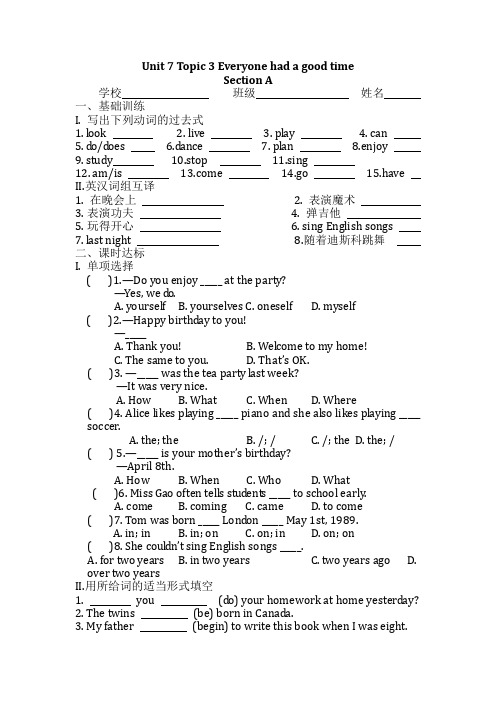
Unit 7 Topic 3 Everyone had a good timeSection A学校班级姓名一、基础训练I. 写出下列动词的过去式1. look2. live3. play4. can5. do/does6.dance7. plan8.enjoy9. study 10.stop 11.sing12. am/is e 14.go 15.have II.英汉词组互译1. 在晚会上2. 表演魔术3.表演功夫4. 弹吉他5.玩得开心6. sing English songs7. last night 8.随着迪斯科跳舞二、课时达标I. 单项选择( )1.—Do you enjoy _____ at the party?—Yes, we do.A. yourselfB. yourselvesC. oneselfD. myself( )2.—Happy birthday to you!—_____A. Thank you!B. Welcome to my home!C. The same to you.D. That’s OK.( )3. —_____ was the tea party last week?—It was very nice.A. HowB. WhatC. WhenD. Where( )4. Alice likes playing _____ piano and she also likes playing _____ soccer.A. the; theB. /; /C. /; theD. the; / ( ) 5.—_____ is your mother’s birthday?—April 8th.A. HowB. WhenC. WhoD. What( )6. Miss Gao often tells students _____ to school early.A. comeB. comingC. cameD. to come( )7. Tom was born _____ London _____ May 1st, 1989.A. in; inB. in; onC. on; inD. on; on( )8. She coul dn’t sing English songs _____.A. for two yearsB. in two yearsC. two years agoD. over two yearsII.用所给词的适当形式填空1. you (do) your homework at home yesterday?2. The twins (be) born in Canada.3. My father (begin) to write this book when I was eight.4. Helen (dance) happily at the party last night.莆田第七中学_________学科校本作业5. They (start) to learn English two years ago.6. Some foreigners (visit) our city in 2008.三、能力提升根据短文内容,用适当的词填空。
部编版九年级英语一单元section a2d翻译

部编版九年级英语一单元section a2d翻译Annie, I'm a little nervous.[]安妮,我有点点紧张.l have to finish reading a book and give a report next Monday.[]我不得不读完一本书,然后下个周一给一篇报告.That doesn't sound too bad.[]那听起来不错.But I'm a very slow reader.[]但是我是个读书慢的人.For the first time, just read quickly to get the main ideas.[]第一次,只是快速地读,为了获取主要意思.Don't read word by word, read word groups.[]不要一个单词一个单词地读,要一个词组一个词组地读.But I don't understand many of the words.[]但是我不理解很多单词的意思.l have to use a dictionary.[]我不得不用一本字典.Try to guess a word's meaning by reading the sentences before and after it.[]试图通过上下文联系来揣摩一个单词的意思.You probably understand more than you think.[]可能你懂得比你想的还要多.That sounds difficult![]那听起来是困难的.Well, be patient.[]嗯,耐心些.It takes time.[]这需要时间.You can become better by reading something you enjoy everyday.[]每天读点你喜欢的东西,你会变得更好.The more you read, the faster you'll be.[]你读得越多,你就会读得越快.。
大学英语三级A级-182
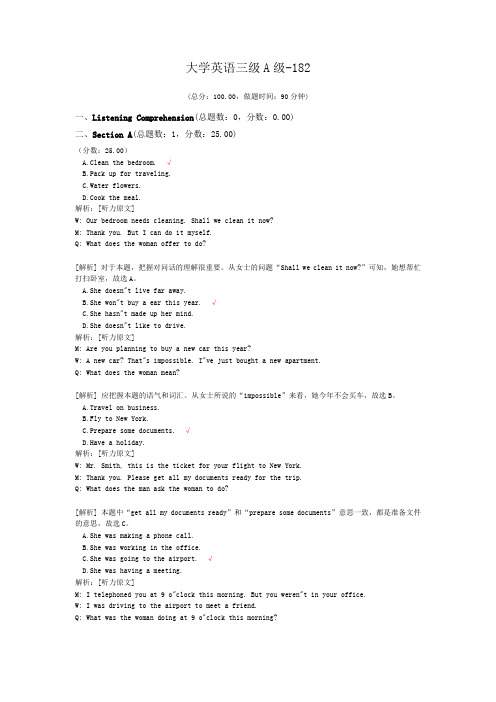
大学英语三级A级-182(总分:100.00,做题时间:90分钟)一、Listening Comprehension(总题数:0,分数:0.00)二、Section A(总题数:1,分数:25.00)(分数:25.00)A.Clean the bedroom. √B.Pack up for traveling.C.Water flowers.D.Cook the meal.解析:[听力原文]W: Our bedroom needs cleaning. Shall we clean it now?M: Thank you. But I can do it myself.Q: What does the woman offer to do?[解析] 对于本题,把握对问话的理解很重要。
从女士的问题“Shall we clean it now?”可知,她想帮忙打扫卧室,故选A。
A.She doesn"t live far away.B.She won"t buy a ear this year. √C.She hasn"t made up her mind.D.She doesn"t like to drive.解析:[听力原文]M: Are you planning to buy a new car this year?W: A new car? That"s impossible. I"ve just bought a new apartment.Q: What does the woman mean?[解析] 应把握本题的语气和词汇。
从女士所说的“impossible”来看,她今年不会买车,故选B。
A.Travel on business.B.Fly to New York.C.Prepare some documents. √D.Have a holiday.解析:[听力原文]W: Mr. Smith, this is the ticket for your flight to New York.M: Thank you. Please get all my documents ready for the trip.Q: What does the man ask the woman to do?[解析] 本题中“get all my documents ready”和“prepare some documents”意思一致,都是准备文件的意思,故选C。
人教版八年级英语上unit2sectionA1a2d教学设计教案

3.引入频率副词的概念,让学生观察并猜测这些词汇在生活中的出现频率,如“always”, “often”, “sometimes”, “rarely”, “never”,为新知的呈现做好铺垫。
-利用问题导向教学法,引导学生提出问题,激发学生的探究欲望,培养他们的自主学习能力。
-结合差异化教学策略,关注学生的个体差异,为不同水平的学生提供适当的学习任务和指导。
-运用形成性评价,及时了解学生的学习进度和困难,调整教学方法和节奏。
3.教学评价:
-通过课堂观察,评价学生在听力、口语、语法等方面的掌握程度。
2.利用多媒体教学资源,创设真实语境,让学生在实际语境中感知、体验、实践英语。
3.设计丰富的课堂活动,如小组讨论、角色扮演、听力练习等,激发学生的学习兴趣,提高学生的英语听说能力。
4.引导学生通过自主学习和合作学习,培养良好的学习策略和团队协作能力。
5.教师在课堂上及时给予学生反馈和指导,帮助学生发现和纠正错误,提高学习效果。
人教版八年级英语上unit2sectionA1a2d教学设计教案
一、教学目标
(一)知识与技能
1.掌握本节课的核心词汇和短语,如"frequency", "usually", "often", "sometimes", "rarely", "never",并能在实际语境中正确运用。
2.能够理解和运用一般现在时的陈述句、一般疑问句及其回答,如"Do you often...?", "Yes, I do./ No, I don't.",描述日常活动和习惯。
外研版高中英语必修第三册Unit4 Section Ⅳ D学案

Section ⅣDeveloping ideas-Writing描写一件艺术品本单元的写作任务是描写一件艺术品,属于说明文。
内容一般包括该艺术品的作者、创作背景、特点以及作者所表达的意境或内涵等。
(一)基本框架1.开头:艺术品简介;2.主体:具体描述;3.结尾:总结、评价。
(二)常用表达1.The Sunflo w er is one of Van Gogh's masterpieces.《向日葵》是凡·高的代表作之一。
2.This is a painting by the Spanish artist,Pablo Picasso,considered to be the greatest Western artist of the twentieth century.这是西班牙画家巴勃罗·毕加索的一幅油画,他被认为是20世纪西方最伟大的画家。
3.My favorite painting is the Eight Horses painting.我最喜欢《八骏图》这幅画了。
4.The whole match of colours is very harmonious.整个色彩的搭配非常协调。
5.Each of the four clay figures looks different and lifelike.四个泥人神态各异,栩栩如生。
6.The group of flame-like sunflowers show his passion of life.那一团团火焰般的向日葵,表达出了他对生活的热爱。
7.In this painting,Picasso showed his feelings about what had happened to the town.在这幅画中,对于这座城镇所遭遇的一切,毕加索表达了自己的情感。
8.It will encourage me to go forward bravely in my study and life.它将鼓励着我在学习和生活中勇往直前。
人教版八年级下册英语Unit7SectionA1a2d教学设计
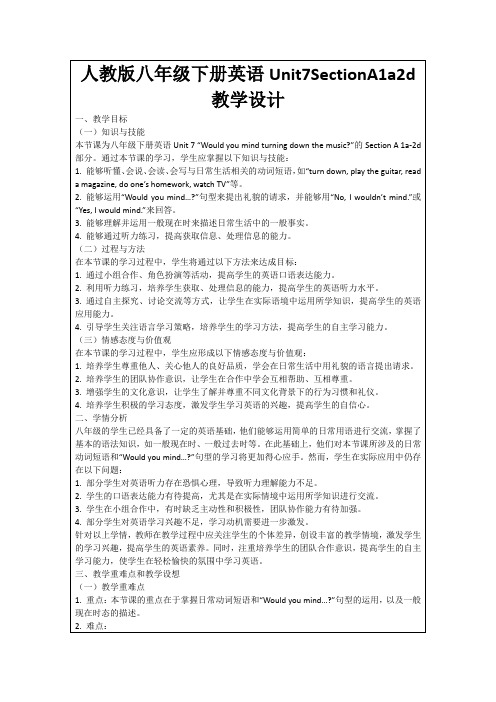
(3)在口语表达方面,教师可以鼓励学生大胆开口,多给予积极评价,提高学生的自信心。
7.课后作业与拓展:设计富有针对性的课后作业,帮助学生巩固所学知识。同时,鼓励学生进行拓展学习,如观看英语电影、参加英语角等活动,提高学生的英语素养。
4.教师布置课后作业,要求学生在课后巩固所学知识,并预习下一节课的内容。
五、作业布置
为了巩固本节课所学知识,培养学生的英语应用能力,特布置以下作业:
1.口语作业:学生需与家人或朋友进行一次关于日常礼貌用语的对话,要求使用本节课所学的动词短语和“Would you mind…?”句型。对话内容需包含至少三个不同的情境,每个情境中双方都要进行礼貌请求和回答。
1.通过小组合作、角色扮演等活动,提高学生的英语口语表达能力。
2.利用听力练习,培养学生获取、处理信息的能力,提高学生的英语听力水平。
3.通过自主探究、讨论交流等方式,让学生在实际语境中运用所学知识,提高学生的英语应用能力。
4.引导学生关注语言学习策略,培养学生的学习方法,提高学生的自主学习能力。
(三)情感态度与价值观
8.教学评价:采用多元化评价方式,关注学生的过程性评价,鼓励学生自我评价和互相评价,使评价成为促进学生发展的手段。
四、教学内容与过程
(一)导入新课
1.教师通过播放一段与课堂内容相关的英文动画片,引导学生关注日常生活中的礼貌用语,为新课的学习做好铺垫。
2.动画片结束后,教师邀请学生分享他们在动画片中所注意到的礼貌用语,引导学生认识到礼貌在日常交流中的重要性。
2.学生的口语表达能力有待提高,尤其是在实际情境中运用所学知识进行交流。
鲁教版英语七年级上册Unit4SectionA1a2d教学设计
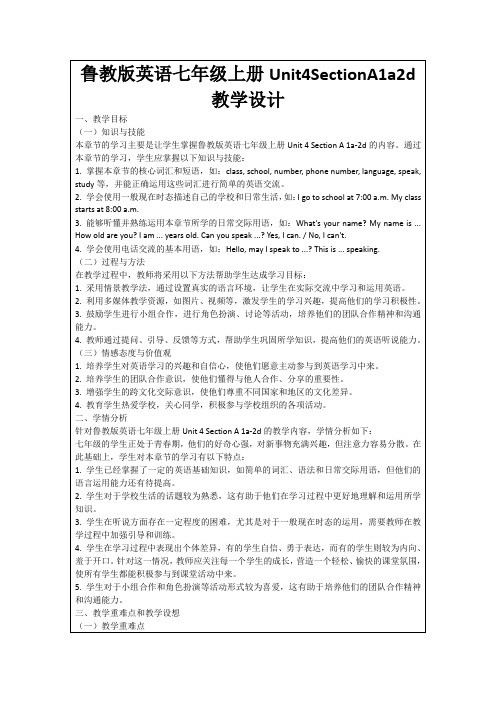
4.鼓励学生在完成作业的过程中,积极思考,主动提问,培养良好的学习习惯。
鲁教版英语七年级上册Unit4SectionA1a2d教学设计
一、教学目标
(一)知识与技能
本章节的学习主要是让学生掌握鲁教版英语七年级上册Unit 4 Section A 1a-2d的内容。通过本章节的学习,学生应掌握以下知识与技能:
1.掌握本章节的核心词汇和短语,如:class, school, number, phone number, language, speak, study等,并能正确运用这些词汇进行简单的英语交流。
3.鼓励学生进行小组合作,进行角色扮演、讨论等活动,培养他们的团队合作精神和沟通能力。
4.教师通过提问、引导、反馈等方式,帮助学生巩固所学知识,提高他们的英语听说能力。
(三)情感态度与价值观
1.培养学生对英语学习的兴趣和自信心,使他们愿意主动参与到英语学习中来。
2.培养学生的团队合作意识,使他们懂得与他人合作、分享的重要性。
1.学生已经掌握了一定的英语基础知识,如简单的词汇、语法和日常交际用语,但他们的语言运用能力还有待提高。
2.学生对于学校生活的话题较为熟悉,这有助于他们在学习过程中更好地理解和运用所学知识。
3.学生在听说方面存在一定程度的困难,尤其是对于一般现在时态的运用,需要教师在教学过程中加强引导和训练。
4.学生在学习过程中表现出个体差异,有的学生自信、勇于表达,而有的学生则较为内向、羞于开口。针对这一情况,教师应关注每一个学生的成长,营造一个轻松、愉快的课堂氛围,使所有学生都能积极参与到课堂活动中来。
(2)开展多样化的听说活动,如听力训练、口语表达等,提高学生的英语听说能力。
八年级下册单词11
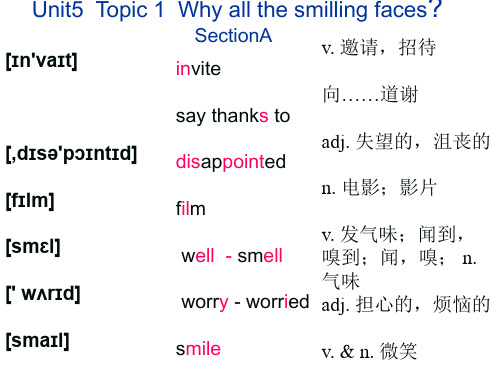
有麻烦,处于困
[fɪr]
fear
境
['dɪfɪkəlti]
difficulty
n.&v. 害怕, n. 困难,难题,
[fæ n'tæ stɪk] [,dɪsə'pɔɪntmənt] [sɔft]
[fɪr] ['dɪfɪkəlti]
adj. 极好的,了 不起的
n. 失望;沮丧; 扫兴
adj. 轻柔的;
照顾,照料 adj. 孤独的,寂寞的;偏 僻的 adj. 活泼的;充满生气的 使振作起来;使高兴起来 adv. 几乎,差不多 adv. 主要地
[ˈləunli] ['laɪvlɪ]
['ɔ:lməʊst] ['meɪnlɪ]
照顾,照料 adj. 孤独的,寂寞的;偏 僻的 adj. 活泼的;充满生气的 使振作起来;使高兴起来 adv. 几乎,差不多 adv. 主要地
rich adj. 油腻的;丰富的;富有的
[test] ['nɝvəs] [spiːtʃ] [,si: 'di:] [rɪ'læ kst] [rɪtʃ]
n.&v. 测试,考查,试验
adj. 焦虑的,惶恐的;神经质 的
n. 演讲
n. 光盘,激光唱片 (全写为compact disc) adj. 冷静的,镇定的
[smɛl] [' wʌrɪd]
v. 发气味;闻到, well - smell 嗅到;闻,嗅; n.
气味
worry - worried adj. 担心的,烦恼的
[smaɪl]
smile
v. & n. 微笑
[ɪn'vaɪt]
[,dɪsə'pɔɪntɪd] [fɪlm] [smɛl] [' wʌrɪd] [smaɪl]
- 1、下载文档前请自行甄别文档内容的完整性,平台不提供额外的编辑、内容补充、找答案等附加服务。
- 2、"仅部分预览"的文档,不可在线预览部分如存在完整性等问题,可反馈申请退款(可完整预览的文档不适用该条件!)。
- 3、如文档侵犯您的权益,请联系客服反馈,我们会尽快为您处理(人工客服工作时间:9:00-18:30)。
D. TOURISM1. THE TOURISM INDUSTRY IN UTAHWith its abundance and variety of recreational areas and activities, Utah has always been a destination for outdoor enthusiasts. Following worldwide exposure from hosting the 2002 Olympic Winter Games, state legislators and businesses are attempting to capitalize on Utah’s tourism potential, both nationally and internationally. In the United States, tourists spent $523 billion in 1999, and $4 billion of that was spent in Utah (Robson 2001).In the past, the state budget only allotted $900,000 for tourism branding and marketing, but new legislation has provided the Utah Office of Tourism with $10 million during this fiscal year to develop a program to attract visitors. Utah’s tourism budget formerly ranked 42nd in the United States, but with this budget increase, it will now be among the top 15 states in the country. Governor Jon Huntsman, Jr.’s goal is to increase the number of tourists who visit Utah by 5 million annually (Wallace, 2005).Table D.1.1 provides a sense of the contribution of tourism revenues to the economy of Utah in 2004.TABLE D1.1Utah Tourism General Economic StatisticsTotal Economic ImpactNumberof Visitorsto UtahEmployment intourismTaxEquivalentfromtourismReturn onInvestmentfrom TourismAdvertisingNearly $5 billion direct; $10 billion direct and indirect. Approx.17.5million in200410% of state’semployment; ranked6th, or 3rd if allelements considered$444 perhousehold peryear8-to-1Source: Utah Office of Tourism, 2005; Robson, 2001.2. UTAH-MEXICO TOURISMIn 2001 there were 263 million entries into the US at the checkpoints on the US- Mexican border in California, Arizona, Texas and New Mexico. The reverse traffic would be comparable. This is one indicator of the extent of the contacts between citizens of Mexico and of the US. Another main contact point is travel for tourism, and this is more relevant to Utah since there is no border with Mexico.In 2004, the U.S. Department of Commerce’s International Trade Administration estimated the number of international tourists visiting the United States was over 46 million. This was a decline from its high point in 2000 when there were 51 million international visitors. These statistics do not count visitors who remain within 25 miles of the border. Of the 2004 figure, 11.9 million came from Mexico, over one-quarter of the total. Mexico’s share has remained stable since at least 1994. Only Canada exceeded Mexico in the number of visitors with 13.9 million. Together, tourists from Canada andMexico represented 55 percent of all international visitors to the United States in 2004 (ITA, 2005).The Utah Office of Tourism does not include Canada and Mexico in recording “International Visitors,” which summed to 9.8 million in 2004. They estimate that approximately 1% of Utah’s international tourists are from Mexico, or 98,000 people per year (Utah Office of Tourism, 2005). This appears to be a lower estimate than would be obtained from the numbers extrapolated from ITA data on air arrivals. In 2003, 17 percent of Mexicans who traveled by air to the US had the mountain states as their destination, summing to 236,000 in total. If even 25 percent of them went to Utah, this would give 59,000. And given the proximity of Utah to Mexico, it is likely that more than half of the Mexican visitors would have arrived by surface transportation, especially since only 21 percent of Mexican visitors to the US arrive by air (ITA, 2005). In any case, even 98,000 visitors from Mexico is a significant number.Data for the US show that 56 percent of Mexican visitors come forvacation/holiday, 47 percent to visit friends or relatives, 23 percent on business, and 9 percent for conventions. It is likely that the vacation share in Utah is higher, though there is no precise estimate available.Mexico is the largest travel destination for US residents. In 2004 19 million visitors went to Mexico, followed by 15 million to Canada. Mexico’s share was 31 percent and, together with Canada, accounted for 68 percent of the outbound visitors. The high point for visits to Mexico was 1996 when over 20 million US residents went there for one or more nights. After a decline in 2002, the volume increased by 10 percent between 2003 and 2004, the same amount as total foreign travel by US residents. Of those total visits, 38 percent were for vacation, 33 percent for visits to friends or relatives, and 22 percent for business. There are no data that would allow estimates for Utah.In the US balance of payments, tourism generates a surplus. In 2004, expenditures in the US by international visitors were $93.3 billion and US residents spent $89.3 billion abroad, for a surplus of $4.0 billion. The surplus reached its highest point in 1996 when it was $26 billion and 2003 was its low point at $1.6 billion (ITA, 2005). The balance with Mexico was negative, however, reflecting the larger number of US travelers to Mexico. In 2003, there was a deficit of $1.2 billion and in 2004 that doubled to $2.5 billion. Again, there are no data for Utah, though one might expect that the flows would be more balanced because of Utah’s attractiveness as a tourist destination. If the state’s tourism development program is successful, it should increase the number of Mexican visitors to Utah and should shift the balance toward the plus side for the state, since there has long been travel promotion to Mexico on the part of local travel agents and air charter companies.3. WINTER TOURISM IN UTAHThe ski and snowboard industry is a very significant component of Utah tourism. International visitors represent a small faction of the ski and snowboard business, yet still contribute to Utah’s tourist economy. Of the over 4,000 visitors polled in Ski Utah’s 2002-2003 survey, international visitors represented 3 percent. Based on the survey, the out of state/international visitor activity was estimated as follows:TABLE D3.1International Winter VisitorsUnited Kingdom .8% of total survey sampleCanada .5% of total survey sampleMexico .2% of total survey sampleGermany .2% of total survey sampleAustralia .2% of total survey sampleTABLE D3.2Winter Tourist ExpendituresExpendituresAggregateAnnual Out of state/International Visitors$695,757,156Utah Residents $164,896,608TOTAL $860,653,764TABLE D3.3Spending Pattern of Non-Utah Skiers and SnowboardersMoney spent per capita average of $251.61/dayMoney spent on mountain average of $82.14/dayMoney spent in town average of $169.47/dayMoney spent on accommodationsSummit County average of $285.05/daySalt Lake County average of $228.45/dayOther Places in UTAH average of $202.04/dayTOTAL PER PERSON PER DAY Average of $536.66/daySOURCE: Ski Utah, 2003Total aggregate expenditures in Utah by out-of-state/international skiers for the 2002/2003 season were estimated to be approximately $695 million, $160 million of which was airfare (Ski Utah, 2003). If one percent of the skiers were from Mexico, they would have spent almost $7 million in Utah during the 2002-2003 ski season. The average skier spends $537 per day in Utah.4. RELIGIOUS VISITATIONIn addition to recreation opportunities, Utah is the international headquarters for the Church of Jesus Christ of Latter-Day Saints (LDS). The Salt Lake LDS Temple has long been an icon of the state’s religious history, and attracts millions of visitors annually as it is known worldwide as the religious symbol of the LDS Church. Mexico represents a large faction of non-US LDS church members, and thus the tourism relationship is a reflection, as many church members travel from Mexico to visit the Salt Lake Temple and other historical LDS-related tourist sites.TABLE D4.1LDS Church Membership Distribution (31 December 2004)United States - 5,599,177South America - 2,904,085Mexico - 1,013,071Asia - 865,987Central America - 527,511Europe - 440,945South Pacific - 396,104Africa - 220,798Canada - 169,633Caribbean - 138,511Source: LDS “Newsroom” /newsroom/page/0,15606,4036-1---12-168,00.html <Accessed June 21, 2005>In addition, Spanish is the second most spoken language by members of the LDS Church. There are 5.8 million English speakers and 3.7 million Spanish speakers, as well as 907,000 Portuguese speakers.A final measure of the centrality of Mexico to the LDS Church is that it has built10 of its 119 temples in Mexico, 8 of those 10 having been constructed in the last five years.TABLE D4.2LDS Temples in Mexico and Construction Dates1.Mexico City (D.F.) 19832.Chihuahua 19993.Sonora 20004.Oaxaca 20005.Tuxtla 20006.Tampico 20007.Villahermosa 20008.Mérida 20009.Veracruz 200010.Guadalajara 2001Source: LDS “Newsroom”: /newsroom/templelistt <Accessed June 21, 2005>5. TOURISM AND UTAH’S JOB MARKETEconomists cite the growing economy, the preparation, celebration and aftermath of the 2002 Winter Olympic Games, the national expansion, and statewide structural economic changes as factors that have led to increasing demand for the types of labor thatimmigrants have traditionally provided (Perlich, 2004). Twenty percent of the population growth in Utah during the 1990’s was due to the increase in Utah’s foreign-born population.Recall that among Utah’s foreign-born population, 42% reported Mexico as their birthplace, compared to 29.5% of the entire nation’s foreign-born population (US Census, 2000). In addition, 52.3% of Utah’s foreign-born population cited their ethnicity as Hispanic. In 1850, Utah recorded only 7 foreign-born residents from Mexico; in 2000, it reported 66,478; and Mexico remains Utah’s largest immigrant source.From 1990-2000, employment in Utah increased by approximately 35,000 jobs annually in areas such as highway construction, light rail construction, sports facility construction, hotel and residence construction, and the staffing of hotels and restaurants. The more recent foreign-born, most of whom are of working age and generally bring few children with them, occupy many of the jobs that propel Utah’s tourist industry. According to Census 2000 data, twelve of the top twenty-five occupations of the Utah Foreign-Born Population were tourism-related (Table D5.1). Recall the importance of Mexicans among Utah’s foreign born population. In addition, the concentration of foreign born in many of these occupations, particularly those that are among the lowest paying, is far higher than their share in the overall working population. For example, there are 5.5 times as many foreign born workers who are dishwashers than would be expected from their share of the Utah labor force. This highlights their centrality to the orderly functioning of the hospitality industry.TABLE D5.1Tourism-Related Occupations of Utah’s Foreign-Born PopulationRank (out of 25) Occupation # EstimatedNumberRelativeConcentration2 Cooks 4,243 3.03 Maids/Housekeeping 4,076 5.44 ConstructionLaborers 3,990 3.55 Janitors/BuildingCleaners 3,589 1.87 Cashiers 2,6510.98 Grounds/MaintenanceWorkers 2,634 3.610 RetailSalespersons 2,1310.611 CustomerService 1,9470.712 Waiters/Waitresses 1,907 1.217 Food Preparation Workers 1,589 2.823 First-LineSupervisors/Managers of Retail SalesWorkers1,1820.425 Dishwashers 1,103 5.5 Source: Perlich, 2004, based on Census 2000, Tables 4-6.Consequently, the three regions of Utah with the largest percent of foreign-born residents, Wendover (46.3 %), Park City (19.4%), and Salt Lake City (18.3%) are alsovery large tourist venues and rapidly growing business and residential communities. The areas of greatest concentrations of foreign-born people in Utah are in close proximity to employment in the hospitality sector. Therefore, while the tourist relationship between Utah and Mexican tourists is not completely balanced, the tourism industry itself would not have been able to achieve the growth it has enjoyed in recent years without the vital labor resources provided by the foreign-born who have immigrated to Utah.REFERENCESITA, US Department of Commerce, International Trade Administration. 2005. “Monthly Tourism Statistics.” < > Accessed September 23, 2005. LDS “Newsroom”: < /newsroom/templelistt >Accessed June 21, 2005 Perlich, Pamela. 2004. “Immigrants Transform Utah: Entering a New Era of Diversity.”Utah Economic and Business Review: May/June 2004, Volume 64, Numbers 5 &6.Robson, R. Thayne, “Utah’s Tourism: Challenges & Opportunities”. February 7, 2001./updir/bebr_Tourism.pdf >accessed 6/21/2005<Ski Utah: Skier and Snowboarder Survey 2002/03, On-Mountain Survey, Salt Lake City Airport Survey, Web Site Survey (Final Results—Full Report, May 2003).Prepared by RRC Associates of Boulder, CO.Utah Office of Tourism, 2005. Personal Communication from David Williams (August 15).Wallace, Brice. 2005. “Bragging about Utah: Eager tourism officials armed with $10 million.” Deseret Morning News (Wednesday, May 18).。
